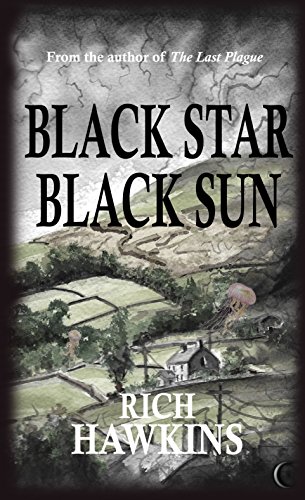Black Star, Black Sun  I have a lot of time for work that doesn't set out to reinvent the wheel; that has clear idea of what it wants to achieve and simply does it without pre-amble or ambiguity. Rich Hawkin's Black Star, Black Sun epitomes that quality; it is not intent on reinventing cosmological, Lovecraftian horror, nor does it desire to shock the reader with its novelty or extremity (though, I will say, there are a couple of particular images that might make you close the book and go away for five minutes to make a cup of tea). Instead, it has a very clear notion of the story it wants to tell, the ethos it seeks to evoke, and does so, getting on with it in a manner not a million miles away from how the principle characters live their lives in the wake of various tragedies, under the bizarre and deranged situations escalating around them. Having returned to his quiet, rural hometown of Marchwood following the disappearance of his wife, protagonist Ben Ottway finds himself lost in a strange nowhere-land of unwelcome nostalgia; recollections of a childhood he has little sentiment for, experiencing strange nightmares and waking visions that, given his circumstances, might be understandable, but for the fact that they seem to be a communal experience; other residents of the sleepy nowhere of his childhood expressing similar maladies, as well as their own peculiar eccentricities. Whilst initially preoccupied with his own despair, the shards of his former life still cutting deep, Ottway eventually uncovers a dark secret within the town and his own past; the source of the increasingly bizarre and disturbing visions that assail him, his Father's sleep-walking episodes, unwelcome truths that, far from providing revelation and catharsis, hurl him deeper into confusion and metaphysical despair than he ever thought possible. Part of the strength of the book lies in the juxtapositions that it draws: scenes of extremely real rural England, descriptions of experiences common to most British people at some point in their lives, punctuated by flights of Lovecraftian bleakness, dreamscapes whose surreal imagery and moribund qualities are like explosions of black and red rainbows in a collage of perpetual grey. There is an oppressive nature to the story that feels almost like the onset of depression itself; the heavy pressue that comes before the breaking of a storm. Reader enjoyment of the story will therefore depend to what degree one is capable of appreciating those states of mind and emotion; at times, the book draws perilously close to evoking genuinely negative psychological states in the reader, which is either fantastic or potentially perilous, depending on individual circumstance. For my part, I massively enjoyed the sense of despair that escalates throughout, building from a fairly domestic tragedy to a potential apocalypse of cosmic proportions. In that, the books is overt in its influences, paying reference to the likes of H.P. Lovecraft, Ramsey Campbell et al, its back mythology in particular notably Lovecraftian, the creatures it describes elaborate and truly bizarre to the point of inducing madness or physical illness in those that look upon them. The text of the book is interspersed with occassional impressionistic, black and white renditions of these entities, of the nightmare states from which they derive, which lends a certain element of surprise, especially when the images recorded are particularly strange and/or horrific. Do not expect any clean resolutions or happy endings here; one of the book's most sincere strengths is that it nails its colours to the mast (all varying shades of despairing grey and abused black) from the first instance and does not deviate; only deepens and deepens, to the point that it feels like it must unravel or collapse in on itself (the central image of the Black Star becoming a fairly clever metaphor for the emotional states its characters experience and translate to the reader). It's a story about personal despair and metaphysical nihilism; of abiding and ineluctable misery, from which not even death can provide deliverance. Reader engagement with and appreciation of the material will therefore largely rely on individual appettite for bleakness; where it will undoubtedly enrapture some with its exceedingly grim stylings, others might well be alienated by them, particularly those that prefer their horror fiction more mythologically traditional, in which “evil” is identified and, ultimately, vanquished, in which protagonists find clean and satisfying resolutions to their despairs and confusions. Black Star, Black Sun feels no need to coddle or comfort its readers; it has little time for bleating sentiment or shrink-wrapped morality: alost every character encountered harbours their own species of despair, their own secret shame, that is ultimately uncovered and made overt in the closing chapters, in which something as ostensibly hideous as the murder of children becomes an ambiguously moral act. In terms of its plot, its characters, its imagery, some might find it fairly well-trodden ground, especially if they are familiar with the work of Ramsey Campbell and of H.P. Lovecraft himself. That said, what it does it does without ornament or deviation: it knows what it wants its readers to experience (nihilism, misery, despair) and it focuses exclusively on that ambition; an exercise in focus that writers who attempt what is beyond their skill or scope might learn from. An abyss of unfathomable despair, but one that leaves the reader in the grip of genuine emotion, however vile that emotion might be. Black Star, Black Sun an be purchased here: Clive Barker Retrospectives: The Great and Secret Show |
AuthorGeorge Lea is an entity that seems to simultaneously exist and not exist at various points and states in time and reality, mostly where there are vast quantities of cake to be had. He has a lot of books. And a cat named Rufus. What she makes of all this is anyone's guess. Archives
May 2020
Categories |
 RSS Feed
RSS Feed